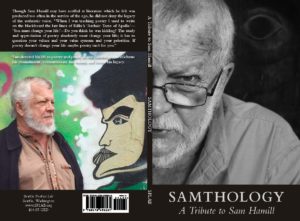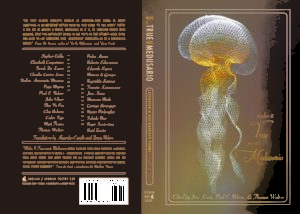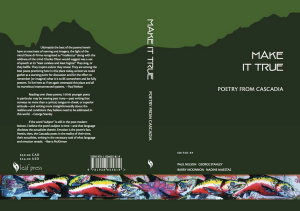I got to Open Books ten minutes before the reading was scheduled to start. Most of the crowd came after I arrived. John Marshall read a nice introduction and rigged a laptop to an overhead projector, so we could see images on the wall as Hillman read. It was part-activist report, part-poetry, but the two aspects complimented, even fed each other. The new book she was in town to promote is: Practical Water. Hillman’s bio is here: http://en.wikipedia.org/wiki/Brenda_Hillman
She mentioned how Duncan and Levertov were guides for her and that Levertov’s late poetry was initially a disappointment, that it had a ragged quality unlike her earlier work. Hillman went back to it after being involved with Code Pink (and its organized resistance to the current war) and enjoyed Levertov’s later poems more, as documents of being witness. She even read one of the Levertov poems as the first half of it was projected onto the screen. (See below.)
In the spirit of Levertov, Hillman discussed the role of poetry in society. She was so eloquent that I was scribbling furiously and could only get a fragment of what she communicated. This was no rehashed speech, either. This was someone open, committed and comfortable talking extemporaneously about these matters. It was clear right away to me that she had taken the Duncan/Levertov poetics and embodied them. She did mention that she was inspired by the San Francisco Renaissance poets, and cited Duncan and Snyder as two chief sources, but in her reading/presentation, she showed that these poets created the groundwork from which a more developed gesture had emerged. Here’s some of what she said at the start:
“Poetry brings a set of values (oppositional) to official culture. Poetry is extremely valuable for this reason… It is important for the sense of the ecology of being in the world.”
Now here’s where I go back to an earlier post regarding George Bowering and Fred Wah. In the introduction to Wah’s Selected Poems, Loki is Buried at Smokey Creek, Bowering says:
“It is no secret that Wah derived early sensibility from Charles Olson & Ed Dorn, poets who found ineluctable relationships between a sense of place as signified, & the projection of the body’s consciousness as signifier.”
And this notion, inspired by Olson’s Proprioception essay, is all about the ecology of being in the world. Going back to that essay, Olson understood the difference between superficial levels of consciousness (he linked them to the ego) and the greater depth of the “SENSIBILITY WITHIN THE ORGANISM BY MOVEMENT OF ITS OWN TISSUES”(1). (Olson’s use of capital letters maintained.) He knew the feeling from experience and described it as being “inside us/& at the same time does not feel literally identical with our own physical or mortal self (the part that can die”.) He said it the unconscious “is the universe flowing-in, inside.” Tell me Pound got this far into it!
Here’s my theory. The poet is an outlaw, in the words of Michael McClure. The pure poet. (He once lectured on this at Auburn Riverside High School during SPLAB’s Auburn period.) Outlaw against WHAT is the question. The answer, the Industry-Generated-Culture. The IGC is a culture seeking what it can get from the people, rather than what it can give to the people. This is a complete perversion of what culture is supposed to be and it is indeed, often perverted: the Super Bowl’s wardrobe malfunction, the pornography industry, politics, the war economy, the fast food and pharmaceutical industries, the widespread use of high fructose corn syrup and genetically-modified organisms, Fox News, the list goes on and on.
How does one exist in a balanced manner in such an environment? As a human in an environment which only espouses a materialistic model, a competition/domination ethos? The conventional answer is pharmaceuticals.
The Archives of General Psychiatry found that 10% of the U.S. population is on antidepressants, a near-doubling in ten years of those numbers (2).
That’s not REAL balance, as the liver of anyone in that percentage will eventually tell you. That, of course, is if they develop the consciousness to understand their own body’s signals. (add THIS notion to the current debate over health care reform!) This capacity to tap into the body’s wisdom is inherently related to proprioception, a feedback system constantly giving us information on our place in the universe, literally. It’s how you can find your mouth while eating crackers while browsing the web. Without proprioception, you’d have to look each cracker directly into your pie hole.
The practice of Projective Verse, or Open form, or Organic Poetry (as Duncan and Levertov called it in the early 60’s and my preferred term) strengthens perception (proprioception-included) through a feedback system that is free-associative in nature, but taps into fields much larger than the poet composing in this manner. In his book Three Poems, Michael McClure elaborates on the method:
To write spontaneously does not mean to write carelessly or without thought and deep experience. In fact, there must be a vision and a poetics that are alive and conscious…When the poem is finished I listen to it…and see that it has a deeper consciousness and brighter thoughts than I was aware of while writing (3).
Robin Blaser wrote a long essay called The Practice of Outside and the TISH group, (including the aforementioned Bowering and Wah) took these notions from Olson, Duncan, Spicer and others and ran with it. (Wrote with it.) Why hasn’t this method been the dominant one in U.S. outsider poetics? It may be as simple as the prevalence of the mechanistic ethos (if that can be called an ethos) which is to U.S. citizens what water is to fish. I’m convinced an organic poetry practice is an antidote; a strengthening of these receptors that leads the poet to deeper fields. McClure likens the practice to being an athlete and it’s a useful metaphor, but I wouldn’t skip the yoga and stair-machine if I were you and I am sure McClure’s not suggesting that either.
Back to the Brenda Hillman reading.
She mentioned that she wrote to Denise Levertov when she was 13. Ironically, it was Levertov who wrote to T.S. Eliot when she was a similar age. But Levertov was to transcend Eliot’s poetics like Hillman was destined to transcend Levertov’s.
Hillman mentioned that, during the 70’s, she was quite disappointed about the turn in Levertov’s verse. Unlike the open nature of her earlier poems, her anti-Vietnam war poems were, in Hillman’s word ragged. But, coming back to them recently, she found the value in them, the value of being witness if nothing else. She read one of Levertov’s poems as an example:
At the Justice Department November 15, 1969
BY DENISE LEVERTOV
Brown gas-fog, white
beneath the street lamps.
Cut off on three sides, all space filled
with our bodies.
Bodies that stumble
in brown airlessness, whitened
in light, a mildew glare,
that stumble
hand in hand, blinded, retching.
Wanting it, wanting
to be here, the body believing it’s
dying in its nausea, my head
clear in its despair, a kind of joy,
knowing this is by no means death,
is trivial, an incident, a
fragile instant. Wanting it, wanting
with all my hunger this anguish,
this knowing in the body
the grim odds we’re
up against, wanting it real.
Up that bank where gas
curled in the ivy, dragging each other
up, strangers, brothers
and sisters. Nothing
will do but
to taste the bitter
taste. No life
other, apart from.
Notice how Levertov resonated with the anguish of opposition and tasting the bitter taste, that she was consumed by it. Duncan warned her in all his Freudian splendor about this tendency to let this feeling overtake one’s higher judgment, but he may have had other motivations beyond Levertov’s mental/spiritual health.
Hillman’s reading/presentation, like the new book, was (is) tied up with images and stories of the Code Pink resistance to the current wars in Iraq and Afghanistan. Her take on the combination of poetry and current events, akin to Ed Sanders’ Investigative Poetry, she calls Reportorial Poetry. She referred to an essay of hers:
Reportorial Poetry, Trance & Activism
Reportorial poetics can be used to record detail with immediacy while one is doing an action & thinking about something else.
Experience crosses over with that which is outside experience; the unknown receives this information as an aquifer receives replenishing rain. Meditative states can be used to cross material boundaries, to allow you to be in several places at once, such as Congress & ancient Babylon.
I recorded notes in Washington while attending hearings & participating in actions to make the record collective and personal. Working with trance while sitting in the Congressional hearings I recorded details in a notebook.
If bees can detect ultraviolet rays, there are surely more possibilities in language & government. The possible is boundless.
Whether or not you have the strength to resist official versions that are devastating the earth & its creatures, you could in any case send back reports. If political parties will not provide solutions, the good can occur when people gather in small groups to work for justice in each community using imagination without force.
People could leave their computers at least briefly to engage with others in public spaces. It is then the potential of each word comes forward.
If you have no time or strength, act without time or strength because they may follow. In the meantime you could imagine that you have them.
Hillman knows the possibilities in government are captive to the advances in culture, because that’s where language lives, thrives and evolves. The culture then propels the politics. (Or doesn’t.) It is not now because the demands of the Industry-Generated-Culture will not allow it. Such a culture is the culmination of the competition/domination ethos and will crash only when said ethos has eaten itself tail first as in the Ouroboros. All things return to ash & we may get to see the happy ending in this one, only to reveal the sinister side of the next reality.
Her poem DRAGONSKIN reports on the real business of war as part description of a subcommittee hearing on a body armor being pitched by a nameless salesman. (Willy Loman on steroids, another symptom of the IGC.)
This evening was so rich, Hillman so tuned in, yet effortless, speaking with such grace and clarity, one could fill a small quote book with critical statements worth repeating and further study. But rather than demonizing the scholars and profiteers of war and letting one’s consciousness resonate with the hate & becoming subsumed by it, Hillman retains intact (in her own words) the “political & spiritual/aesthetic parts of yr (her) brain together.” This is evidenced by the line from the poem, In a House Subcommittee On Electronic Surveillance:
i can see half a heart in each Congressman
In this capacity she’s consistent with her urge for us in honoring yr interior wildness. But, unlike the early settlers of this continent who saw the North American wilderness, had the shit scared out of them & began to attempt to cultivate a huge English garden, Hillman has used the combination of SF Renaissance/Black Mountain poetics, imbued with a interior wilderness (so accessible to West Coast residents) to brilliant effect. This is way beyond the parlor tricks of most contemporary poetry. This is the kind of work still giving light in 400 years when we have safely overcome the tremendous darkness of our current time.
9:08P – 11.21.09
(1) http://www.globalvoicesradio.org/What_is_Consciousness_5.5.05.htm
(2) http://www.usatoday.com/news/health/2009-08-03-antidepressants_N.htm
(3) http://www.globalvoicesradio.org/Inside_Dolphin_Skull_10.13.06.htm





This all resonates powerfully with me. I’ve been dwelling on why and how it is so difficult the American English-speaking poets I know to speak what their bones know about the public turmoil in our American culture, politics and economic culture.
I’m working on a concept I call “Actionable Evidence” to address these issues poetically. The main foundation I’ve found for writing as authentically as possible is to maintain a solid meditation practice, to establish a deep silence, out of which creativity flows organically, to use your term, rather than intentionally, programmatically, or rationally.
Out of that understanding, I would quibble with your statement that the poet, and poetry, is outlaw against the “Industry-Generated-Culture.” This is a good instance of what poetry is against, but I would say that poetry is fundamentally against inappropriate power relationships of all kinds. Its task, in this matter, is to bring power relationships to consciousness in the reader (and the writer!) so these power relationships – especially hierarchical relationships can be felt proprioceptively, intimately, and evaluated for appropriateness and authenticity. The genius of the Occupy Movement, and to some extent the earlier Civil Rights and Anti-Vietnam War Movements is a devotion to non-hierarchical power relationships. This is a good working definition of anarchy: that all power is mediated peer-to-peer. This method cuts across the grain of hierarchy, and brings its hidden methods immediately to view and evaluation.
Great work!
Dwain, It is ironic that you find this the weekend Brenda Hillman is back in Seattle at our SPLAB. (Details: http://www.splab.org). I do not think we’re in disagreement. The industry-generated-culture actually pervades much of the poetry scene in the U.S. and other capitalist countries and the lure of fame has similar dynamics in socialist countries. Omar Perez spoke brilliantly about this in his Jacket Magazine interview.)
Also, to characterize something as being in opposition to something else is always going to be a limited view. Poetry is FOR deepening one’s gesture, one’s experience, individuation, consciousness, perception and sense of place, or it is when it is at its best. I think this is why the false hierarchical structures are seen as limitations by those whose practice (poetry or otherwise) allows them a peek behind the veil.
The title of your essay reminds me of a favorite McClure poem; Action Philosophy.
THAT GOVERNMENT IS BEST WHICH GOVERNS LEAST.
Let me be free of ligaments and tendencies
to change myself into a shape
that’s less than spirit.
LET ME BE A WOLF,
a caterpillar, a salmon,
or
an
OTTER
sailing in the silver water
beneath the rosy sky.
Were I a moth or condor
you’d see me fly!
I love this meat of which I’m made!
I dive in it to find the simplest vital shape!
AH! HERE’S THE CHILD!!!
WHAT’S LIBERTY WHEN ONE CLASS STARVES
ANOTHER?
Blessings,
Paul Nelson
Seattle, WA